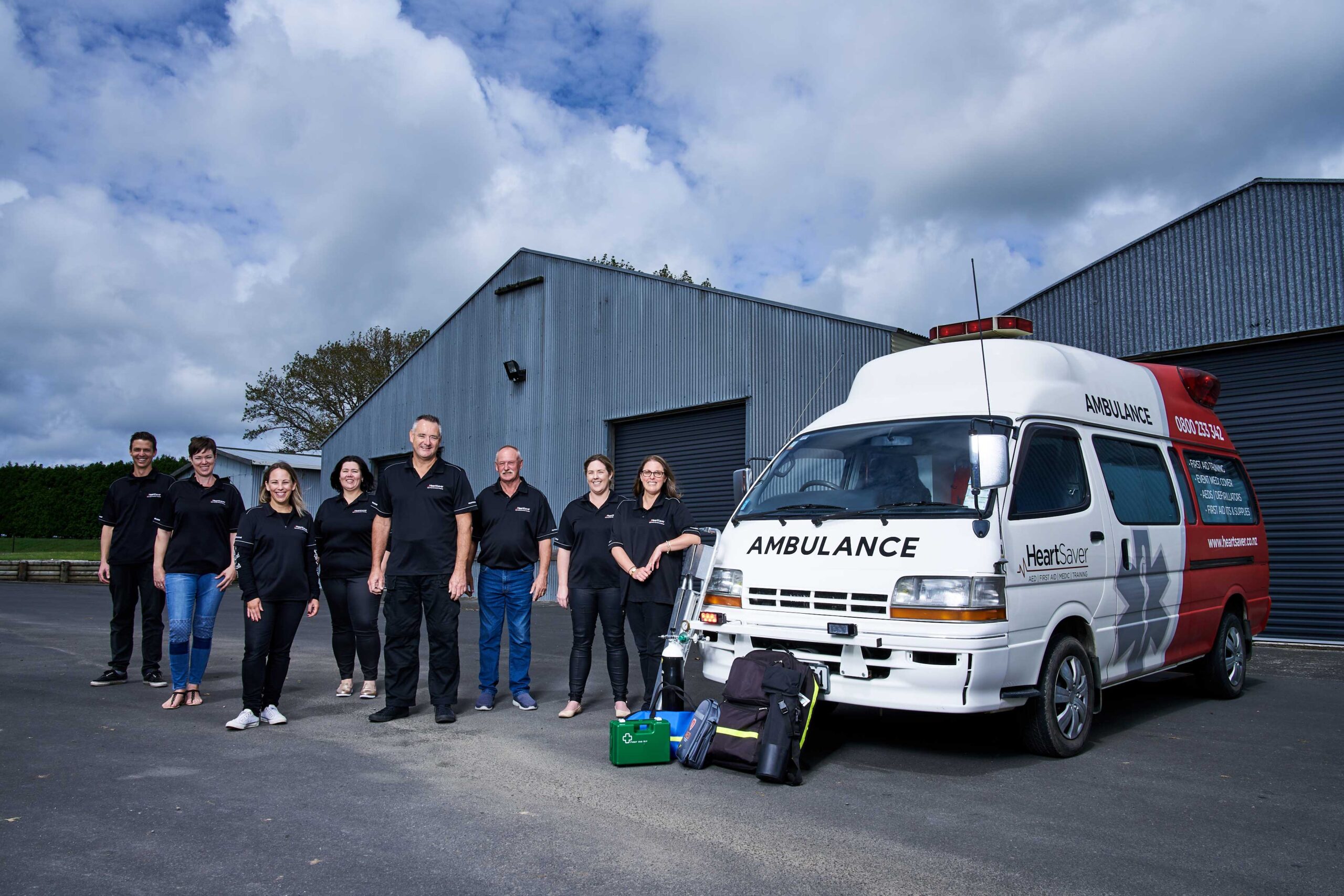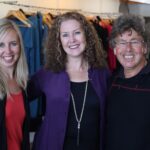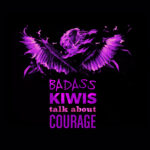Absolute lifesavers
Heart Saver got off to a flying start in 2012. Five years later, some brilliant marketing has taken the niche business to a whole new level, and the title of supreme winner of The David Awards 2017. Mike, Helen and the Heart Savers is a hard act to follow.
In a February 2014 NZBusiness story Mike and Helen Mander spoke of “a busy five years ahead” – more staff, more time on the business, less out-of-town sales trips for Mike.
And in terms of the widespread take-up of AEDs (automated external defibrillators), it wasn’t a case of if it was going to happen, but when, they said.
All those predictions have been right on the money, and there are still a couple of years to go.
For the Kumeu, Auckland-based business, life has been full-on, and successful – largely due to smart marketing, excellent mentoring and some dedicated teamwork.
Heart Saver began life in April 2012, operating from Mike and Helen’s spare room, and it was profitable from day one. The business was the result of Mike being made redundant from his senior sales role in the finance sector. The couple set up Heart Saver with the redundancy money so they could look after their then pre-schooler Scotty (they have two children: Amy aged 14 and Scotty now eight).
Just three months were allocated for planning the business – and in terms of income, there was never any plan B. Not surprisingly their friends though they were crazy.
Heart Saver was a logical way to combine their previous work experiences. Helen is a qualified accountant. Mike had his sales expertise and has been a local volunteer firefighter for 22 years (he still does weekly shifts and training).
In fact, it was Mike’s experience assisting on medical response calls that brought home the realisation that AEDs are vital pieces of kit to have on hand. That was the couple’s first major hurdle – building public awareness of AEDs and convincing all size businesses of their importance. There was also ignorance on the operation of the devices – with many people not aware of their automation and the fact that they can be used with minimal training.
Thanks to a tele-salesperson based in Auckland and Mike travelling around New Zealand, sales quickly grew. Heart Saver moved into its current Kumeu office in May 2013 and early this year they found themselves in a position to take over another level in their office building.
AED sales were supplemented with rental sales and a comprehensive annual on-site testing regime was added, not just to smooth cashflow and add value to the Heart Saver service, but to ensure the AEDs’ performance level isn’t compromised and lives put at risk.
First aid training and numerous health & safety services and products are also on offer.
Mike and Helen remember their very first sale like it was yesterday. The framed invoice on the wall still serves as a reminder of where it all started.
The market has quickly matured. Awareness of AEDs and their importance for dealing with sudden cardiac arrest has grown significantly, and Heart Saver can claim a lot of the credit.
Marketing initiatives
The company’s success in The David Awards 2017 was largely based on its marketing strategy over recent years.
“For the first few years our marketing efforts consisted of cold calling and the occasional email,” says Helen. “So when we started doing marketing in earnest and saw the impact it had, we were blown away!”
The couple’s first big marketing lesson was that you need to have a plan and a focus. Marketing can easily get left behind for more urgent tasks, they say. “But what’s the point of being in business if no one knows who you are?” says Helen.
“It also took a while to have the confidence that we had stuff to share that people wanted to listen to. At first we felt too insignificant to be talking about life and death matters and giving our opinion on New Zealand’s AED situation. We left that to the big boys in the industry.
“But when we saw it wasn’t happening and realized we could make a difference, we stepped up to the plate – with trepidation!
“Now we’re proud of what we have done in terms of making more Kiwis aware of what sudden cardiac arrest is and the need for more AEDs around the country.”
“When Dr Mayhew shared his story about how his life was saved by one of our AEDs on Seven Sharp our website immediately went down from the response!”
The Become a Heart Saver campaign had all the ingredients of success: familiar faces, compelling stories, community involvement, and a “That could be me” factor.
“Launching it with ex-All Blacks, and current Warriors, doctor John Mayhew was a massive moment for us,” says Helen. “We were humbled that he would lend us his time and profile to help spread the message about sudden cardiac arrest and the campaign – where we are now giving away two AEDs a month to a community group, school or NFP.
“When Dr Mayhew shared his story about how his life was saved by one of our AEDs on Seven Sharp our website immediately went down from the response!”
Securing comedian Paul Ego to make their CPR videos watchable was another coup. And ironically the AED gifted to Paul in appreciation, who then donated it to his tennis club, later saved the life of a young policeman on his stag do! “Talk about doing work that matters,” says Helen. “The timing of it all was just so spooky!”
In 2017 alone, nine people have successfully used a Heart Saver AED. Helping save lives is the main reason Mike and Helen get out of bed every morning.
To date, the Become a Heart Saver campaign has delivered an extra 14 AEDs into communities. Cigna and GrownUps came on board from June 2017, boosting the campaign by matching Heart Saver’s donation each month.
“Not only has the campaign raised awareness for sudden cardiac arrest and AEDs, it has raised awareness and profile for the Heart Saver brand. People are talking about AEDs and they’re talking about us,” says Helen.
A rebrand in early 2016 and a new website have also played an important role in the company’s growth. “The Casual Fridays team refreshed our look to better reflect the professional business we had become. It gave us so much more pride and confidence in the way we presented ourselves to the world,” says Helen. “Plus it was a fun exercise doing up an old ambulance in our new branding.”
Powerful lessons
Of course, the benefit of hindsight provides Mike and Helen with clues on how they could have done things better over the past five-and-a-half-years.
If they were to start a business tomorrow, their focus from day one would be on processes, they say.
“It doesn’t matter if the processes aren’t perfect – you can tweak as you go – but it would be a lot easier to do it right from the get-go, than to start from scratch five years in, like we did.
“We’d also automate as much as possible a lot earlier, to get rid of some of the grunt work we were consumed by in the early days,” says Helen.
Being good at recognising when they need help and finding the right people to deliver that help, has been vital, she adds. “A couple of years in we started to look around for external people who had the skill-sets we personally didn’t. It can be costly, but we ended up saving a lot of time and generating great results.”
Getting Zac de Silva from Business Changing on board as business coach and outsourcing a marketing team for the past two years provided the professionalism and direction they needed and pushed the business forward, says Helen. “In hindsight, we should have done this sooner, rather than relying on our natural gut instinct.”
There have been no major calamities, like costly mistakes or biting off more than they could chew, because Mike and Helen have always taken a conservative approach to business.
“At times we’ve possibly been too conservative,” explains Helen, “but we wanted the business to be sustainable. We didn’t want quality to suffer as we grew our brand so we’ve focused on doing that in a controlled way.
“We’ve been under-resourced at times but we just future-plan the best we can and then suffer the late nights and long hours in the meantime!”
Taking stock
While growth has accelerated in the past 18 months, Heart Saver’s founders believe there are more opportunities and markets to tap into, and they have the resources to do so. The recent appointment of an operations manager will allow Mike and Helen to spend more time working on the business, rather than in it. That may be a cliché – but the couple have long dreamt of such a time and are genuinely excited by the possibilities it brings.
“The Heart Saver office is slowly filling with an amazing team of passionate people who genuinely care about what they do and who love helping people,” says Helen.
“They’re hard working and go above and beyond for clients, which has really helped us take the business to the next level.”
She says the plan is to focus on new revenue streams and diversifying products and services in order to remain sustainable and viable. “We’re always on the lookout for what else we can offer our customers, both existing and new. These new avenues aren’t something we’ll hurry though – we’d rather get it right and do it well than rush into mistakes.”
So are the stress levels for Mike and Helen more manageable now, five-and-a-half years after starting out?
“At the start it was just the two of us; no other day job, no plan B. We’d be kept awake at night wondering if we would sell products, make a profit that month, pay the bills.
“We still have stress points but they’re different ones now that we have staff and a 3,000-plus client base. That brings new stresses that we wouldn’t have dreamed of five years ago!
“To be fair, both of us are worriers by nature, mainly because we’re so invested in what we do and have such high expectations of ourselves and what we should be achieving.”
Helen says being able to utilise people with the right skillset and expertise gives them the feeling of being more in control.
“It’s nice not having to take sole responsibility for the execution of every project and every decision, especially in areas that are not our forté. Being able to seek advice or a second opinion definitely makes the workload more bearable.
“You really need external people in your business, particularly if you have a co-founder at the helm with you and especially if you are a husband and wife team. Having a third party to give their unbiased opinion is so helpful.”
In search of stability
While AEDs will remain Heart Saver’s core focus – the intention is to continue growing the business into new markets (Australia and the Pacific Islands) and introducing new products and services. An example is lockable cabinets for AEDs, which makes the devices much easier to access in an emergency situation.
There are also exciting opportunities within the health and safety industry.
“We’ve been developing an awesome software called Safety Monitor for the past couple of years which we have recently launched,” says Helen. “It’s a cloud-based app that monitors a company’s health and safety activities and requirements.
“It’s an amazing product and we already have a significant client base of customers subscribing to it, including some big name corporates. It’s another example of seeing a pain-point of our clients and being able to fix it.
“Growing Safety Monitor will be a strong focus for us going forward.”
As for the home front, Mike and Helen know the whole Heart Saver experience has invaded family life, but they’re confident they’ve passed on a strong work ethic and valuable lessons and values around work to their children.
“At the very least a good understanding about what it takes to buy the things they want in life, like iPads!” says Helen.
Although business ownership is all consuming, they’re grateful for the flexibility it gives them – for things like school pick-ups and drop-offs, the occasional class trip, and family holidays.
Mike and Helen admit that working together has led to “robust discussions” at times, but they say their mutual respect, support and trust, plus appreciation of skillsets, more than makes up for it.
Balance and stability in their relationship has been helped by Mike’s continued involvement with the volunteer fire service. Weekly shifts and training at the station provide an enforced break and outlet from work.
“Mike had a health scare late last year which really propelled us to get an operations manager sooner, to help with the workload,” adds Helen. “It was a huge lesson to us that you can only operate at 120 percent for so long.
“The kids are also helpful in that respect; some days we would work all hours under the sun but having to stop to pick up the kids or help them with homework forces you to take a step back and brings things into focus.
“We also go camping at Christmas to a place with no cellphone coverage, which forces us to totally switch off and let the rest of the Heart Saver team take control!”
This cover story featured in the December 2017 edition of NZBusiness.



